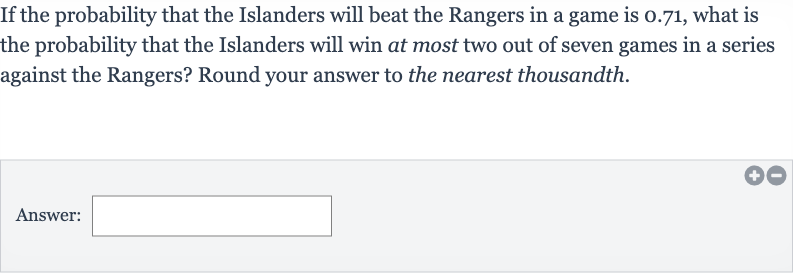AI tutor
Welcome to Bytelearn!
Let’s check out your problem:

If the probability that the Islanders will beat the Rangers in a game is . , what is the probability that the Islanders will win at most two out of seven games in a series against the Rangers? Round your answer to the nearest thousandth.Answer:
Full solution
Q. If the probability that the Islanders will beat the Rangers in a game is . , what is the probability that the Islanders will win at most two out of seven games in a series against the Rangers? Round your answer to the nearest thousandth.Answer:
- Identify Formula and Values: Identify the binomial probability formula and the values of , , and . The binomial probability formula is , where is the number of trials, is the number of successes, and is the probability of success on a single trial. For this problem, (seven games in a series), (probability that the Islanders will beat the Rangers in a game), and will take on the values , , and because we are looking for the probability of the Islanders winning at most two games.
- Calculate Probability for : Calculate the probability for . Using the binomial probability formula, we calculate : is the number of ways to choose games out of , which is . is because any number to the power of is . is . Now we calculate .
- Calculate : Calculate .
This calculation gives us approximately .
Now we can calculate :
. - Calculate Probability for : Calculate the probability for . Using the binomial probability formula, we calculate : is the number of ways to choose game out of , which is . is . is . Now we calculate .
- Calculate : Calculate .
This calculation gives us approximately .
Now we can calculate :
. - Calculate Probability for : Calculate the probability for . Using the binomial probability formula, we calculate : is the number of ways to choose games out of , which is . is approximately . is . Now we calculate .
- Calculate : Calculate .
This calculation gives us approximately .
Now we can calculate :
. - Calculate Total Probability: Calculate the total probability for , , and . The total probability that the Islanders will win at most two out of seven games is the sum of the probabilities for , , and : Round this to the nearest thousandth to get the final answer.
More problems from Find probabilities using the binomial distribution
QuestionGet tutor help
QuestionGet tutor help
QuestionGet tutor help
QuestionGet tutor help
QuestionGet tutor help
QuestionGet tutor help
QuestionGet tutor help
QuestionGet tutor help
QuestionGet tutor help
QuestionGet tutor help
